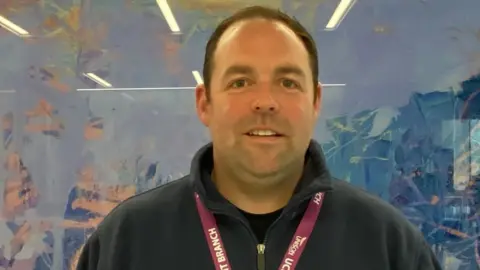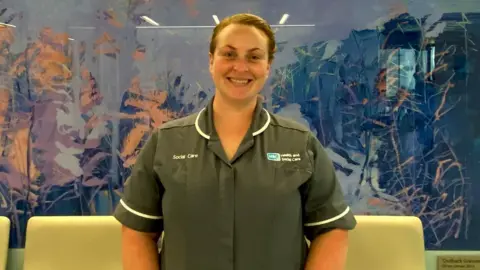NHS at 75: CPR call for ailing Northern Ireland health service
 BBC
BBCNorthern Ireland's health system cannot expect its staff to "step up time and time again" to provide patient care and ensure their safety.
That is according to the head of Northern Ireland's Confederation for Health and Social Care, which is marking the NHS's 75th anniversary.
A long-term funding plan, political leadership and transformation are all overdue, Michael Bloomfield said.
Difficult choices - whether here or in London - need to be made soon, he said.
"There is a clear vision for what needs to happen, the leaders across the health and social care system know what needs to happen - we just need political leadership to make sure it happens," he told BBC News NI.
The 75th anniversary of the NHS was marked across the UK, including at Stormont, with parties, afternoon teas and music.
On Wednesday night, some of Northern Ireland's most iconic buildings, including Stormont's Parliament Buildings and Belfast City Hall, were lit up blue.
 Pacemaker
PacemakerGuest of honour at the Stormont event was six-year-old Dáithí MacGabhann, who inspired a change in the organ donation law.
Amid all the celebrations, there are mixed feelings about the current condition and future of health and social care.
The director of the Royal College of Nursing NI, Rita Devlin, described the idea of not having an NHS as "unthinkable".
"We need to make sure that the environment that we are asking our nurses to work in is one that values the work that they do and fairly pays and rewards them for what they do," she said.
Other issues that need addressing, she added, were career pathways, training and ensuring that "when a nurse wants to stay at the bedside, that that is valued equally as the nurses who want to go into management".

Analysis: Change needed for NHS to keep hitting milestones
There has been much talk in recent days about how much we love the NHS as it marks its 75th anniversary.
While Northern Ireland's system was created separately, it holds the same principles, including that it is free of charge.
But is our romantic notion and love affair with the old dame waning?
Considering the trauma around waiting lists, workforce, funding, strikes and lack of leadership - if the NHS is to exist in another 75 years, in 2098, it requires real input.
As we have witnessed in Northern Ireland, a plan is simply not enough.
 Getty Images
Getty ImagesWhether it is patients or staff, people are key to its success.
Patients, where appropriate, need proper intervention to prevent them becoming ill in the first place. Physical activity, healthy eating and a functioning GP service are all key.
A sustainable workforce requires proper recruitment and policies that will make it robust. It should be led and shaped from within and by those who know what works best.
Suitable pay is important too so that workers on the front line feel valued and resilient.
None of the above will happen without a Stormont executive or leadership, including from within the health trusts.
While we love old dames, if the NHS is to make 100 there are many who feel that it needs to be allowed to re-invent itself and become a much younger and more flexible model.

County Armagh GP Frances O'Hagan said general practice was in a very different place than it was 75 years ago when the health service began and the NHS - or the grand old lady - was in its prime.
"We are seeing great challenges in primary care, we are seeing the lady (of the NHS) is possibly in palliative care and we have to prevent her getting to end of life," she said.
She added that for some patients, the system worked brilliantly - but often "getting in" is the most difficult part.
Looking to the future, according to Prof Mark Taylor, a "robust workforce strategy" is required but also a "realisation that prevention is better than cure".
"Gone are the days where a hospital could have all facilities and all specialists within the one building," he said.
"We have centres of excellence where people may have to travel and they may have to travel to a bigger hospital to have surgery of whatever description, so I think we've got to say we can't keep putting money into the health service in its current format and expecting a different result."
He said authorities needed to look at how to make the NHS more efficient, whether that's clearing the backlog in surgery, his own speciality, or in "making sure people get earlier diagnosis and more timely treatment".
At the Ulster Hospital, the car park is full of vehicles and queuing ambulances - a familiar picture in winter months, but, according to emergency department consultant Sean McGovern, people are coming through its doors in summer when they cannot be seen elsewhere.
He said if the NHS is to see 100 years there needs to be a lot of change including extra focus on social and end-of-life care so older people don't end up in an Emergency Department.
"Many of the patients who are waiting for a bed are at end-of-life care and their wishes would be to be cared for in the community.
"We need to be stronger in professional development for people who go into social care and domiciliary care as careers," he said
While all Northern Ireland's medical royal colleges agree there needs to be monumental change - a significant question is will that change be implemented by local politicians or Westminster.
Peter Owens, a catering assistant at the Ulster, said it's important to remember all staff who work in hospitals.

"Everybody thinks hospitals and they automatically think doctors and nurses, they don't think about the patient experience staff, the admin staff and all the band two and band three staff who keep the place going," he said.
"Everybody thinks about the doctors and nurses, but it's more than that, it's the likes of myself and the likes of all the other kitchen staff from the cooks to the service assistants, even the people working in the dining room."
Samantha Foley is a domiciliary care worker who visits on average 37 people in the community during a 12-hour shift.
"When you go into work you're putting your own feelings and everything to the backburner and you're there to provide a service for them," she said.

"It could be the smallest little thing that you're doing for them, but it makes a big difference."
Health care workers in the rest of the UK recently received a pay uplift, but it did not apply to Northern Ireland,
Samantha said: "We feel like we are the underdogs really, we aren't getting what we should be getting, we work long hours and we're all having to pick up extra shifts to keep our households afloat.
"I've 10 extra shifts booked this month already."
